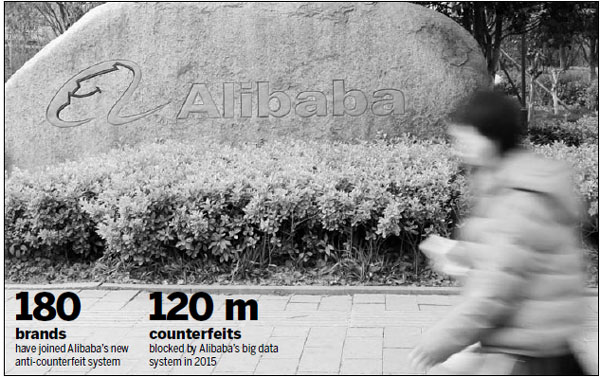New system steps up fight against fakes
In the latest move against online intellectual property rights infringement, Chinese e-commerce giant Alibaba Group has joined forces with a number of leading global companies to launch a new system that aims to root out counterfeit products being sold online.
The IP Joint-Force System, which comes online on Friday at an IP conference in Hangzhou, allows rights owners to input detailed information about their products, and uses big data technologies to search for counterfeit items in online shops. Links to suspected counterfeit items are then sent to rights owners for analysis, and they can file a complaint online if the link leads to a website or online store selling counterfeit products.
Ye Zhifei, IP protection supervisor at Alibaba, said the fight against counterfeit goods is being made more difficult because more fake items are being sold at the same price as genuine ones.
"If a Luis Vuitton (product) sells at 5,000 yuan ($750), many consumers will assume it is genuine, but actually it may not be," Ye said. "In this case we need the right owners to use their professional judgment to decide whether or not it is genuine."
Alibaba's chief platform governance officer Zheng Junfang said at the system's launch ceremony that in order to be effective, IP protection requires cooperation between multiple agencies.
"It is impossible for an e-commerce platform to be certain whether or not a product being sold online is genuine," she said. "The platforms, rights owners and law enforcement agencies must communicate and cooperate with each other to create an effective IP protection model in this complex and changing internet age."
Zheng also noted that, with the rapid development of e-commerce in China, the focus of IP protection has shifted from the offline to the online world, and internet technologies have not only helped the growth of e-commerce, but also provided new methods for IP protection.
"Using big data technologies, we can quickly detect producers of counterfeit goods, and even cross-border counterfeiting groups," she said.
Yao Zhiwei, director of the Institute of Law at Guangdong University of Finance, echoed Zheng's sentiments. "Without the internet, rights owners had to go to the physical market to defend their rights, which resulted in higher costs and greater risks," said Yao.
"In the internet era, all a rights owner needs to do is search online to find suspected counterfeit products and then file a complaint online if they find counterfeit products," he said. "An American rights owner can do this in his office in the United States and does not have to come to China.
"A rights owner has no reason not to cherish such a partnership."
More than 180 international brands have already partnered with Alibaba to use the system, including Microsoft, Samsung, Toyota, Nike and Luis Vuitton.
Liu Yanxia, anti-counterfeiting manager at Beijing-based Xiaomi Inc, said Alibaba's new system will drastically cut the time it takes to both search for counterfeit products and file complaints.
"It takes me five minutes to determine if a link has led to a site that is selling counterfeit goods, but the (new) system can authenticate 50 to 100 links in five minutes," said Liu. "I believe once the system comes online, we will begin to see fewer fake products on the market."
Automatic infringement recognition
Alibaba has developed a world-leading active counterfeit control system that automatically blocks websites selling counterfeit goods and does not require rights owners to file online complaints.
Last year, the infringement recognition system helped Alibaba find and block eight times the number of websites, and led to the removal of eight times the number of goods from the online marketplace than when right owners had to file online complaints. The figure had increased to 22 times by the end of June, which means before a rights owner files a complaint, 22 counterfeit items had already been found and removed automatically, said Zheng Junfang, Alibaba's chief platform governance officer.
She said the company's active control also includes an image recognition system.
"All the technologies will help the rights owners reduce costs and increase efficiency when protecting their rights," she said.
A report released by the company in April said the company blocked more than 120 million webpages for counterfeit goods on its flagship online shopping portal taobao.com in 2015, thanks to its big data-based system that integrates image recognition, cross analysis and smart data tracing technologies to detect counterfeits.
Alibaba Group is using its technical expertise and working with the government against counterfeiting.
In May last year, the company cooperated with the anti-counterfeiting authority in Zhejiang province to locate and arrest a number of counterfeiting groups.
Using its big data technologies, the law enforcement authority raided 244 premises and seized roughly 300 suspects in three months. The total value involved in the cases reached 816 million yuan ($122.4 million).
zhangzhao@chinadaily.com.cn
|
An Alibaba employee walks into the company's headquarters in Hangzhou, Zhejiang province. Shi Yan / For China Daily |

(China Daily 07/06/2016 page17)















